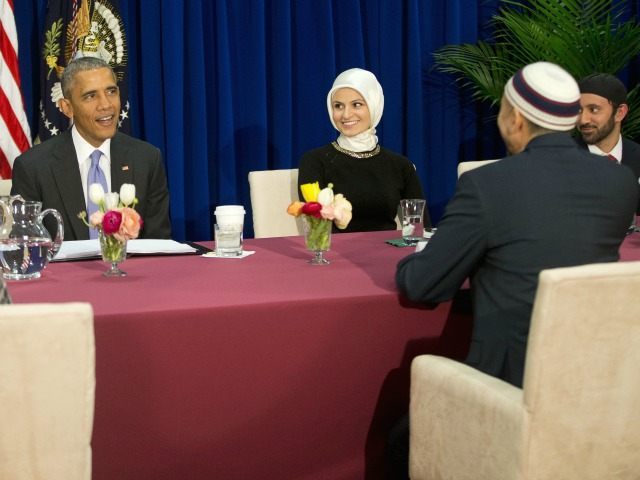A New York Times op-ed argues that Obama’s visit to the Islamic Society of Baltimore mosque “demonstrates tacit acceptance of a form of gender apartheid.”
From the New York Times:
As President and Michelle Obama argued decades ago in the context of the U.S. civil rights movement, separate is indeed unequal. To Muslim women’s rights activists fighting for equal access to mosques as part of a broader campaign for reform — from equal education for women and girls to freedom from so-called “honor killings” — the president’s visit to a mosque that practices such blatant inequity represents a step backwards. While it may be meant to convey a message of religious inclusiveness to American Muslims, the visit demonstrates tacit acceptance of a form of discrimination that amounts to gender apartheid. For that reason, we will be standing outside the mosque on Johnnycake Road, as close as the Secret Service allows, to protest the separate and unequal standards inside and advocate for equal rights.
We believe it is the role of government to protect women’s rights within religion, if a place of worship gets federal nonprofit benefits, just as it protects civil rights in the secular space. Places of worship in the U.S.would not be allowed tax-exempt status if, for example, they were to seat African Americans in segregated spaces. To condone the mosque’s gender segregation is particularly ironic coming days after the White House announced efforts to win equal pay for women and increased workplace benefits for women in the military.
President Obama should be aware that on any given day a woman or girl worshiping in the mosque would be dispatched away from the musallah where he will stand to speak out against “Islamophobia,” to the “prayer room for females,” as one worshipper described it. In much the same way that he wants to mitigate Americans seeing Muslims as the “other,” we have to challenge the Muslim systems that segregate women as the “other.” He should know that promoting women’s rights in mosques is a key part of fighting the ideology of extremism — a fight that he asked American Muslims to help wage in an address to the nation in December. A theology of Islamic feminism is our best answer to the extremism of ISIS, al-Qaeda and other Muslim militant groups. Even the most conservative of Islamic scholars acknowledge that, in the 7thcentury, the sunnah, or tradition of the prophet Muhammad, was to allow women to pray in the main hall of his mosque in Medina without any barrier in front of them.
“While the free world awaits a Muslim reformation, the leader of the free world shows blatant disregard for gender equality by visiting a mosque that treats females like second-class citizens,” says Raheel Raza, a Pakistani-Canadian activist, author and cofounder of the Muslim Reform Movement, a new initiative that we support, advocating for peace, women’s rights and secular governance. “This makes our work as activists extremely difficult because equality is one of the main tenets of our reform movement.”
The president has an opportunity to shine light in a place once associated with the darkest extremes of Islam. His motorcade will re-trace the path of al-Qaeda leader Anwar al-Awlaki: FBI surveillance notes document that al-Awlaki, then a local imam, drove down Johnnycake Road to enter the Islamic Society of Baltimore at 5:56 p.m. on the evening of November 11, 2001. (A copy of the notes was released under the Freedom of Information Act).
Today, in an estimated two-thirds of mosques around the United States, women and girls are segregated in dark basements, sparse balconies, separate rooms and even behind shower curtains in the “sisters’ section,” listening to Friday sermons piped in through shaky sound systems and watching them, if we are lucky, via TV screens. It’s too often only on “interfaith” occasions like the president’s visit that women and girls get to step forward into the “brothers’ section.”
Read the rest of the story here.

COMMENTS
Please let us know if you're having issues with commenting.